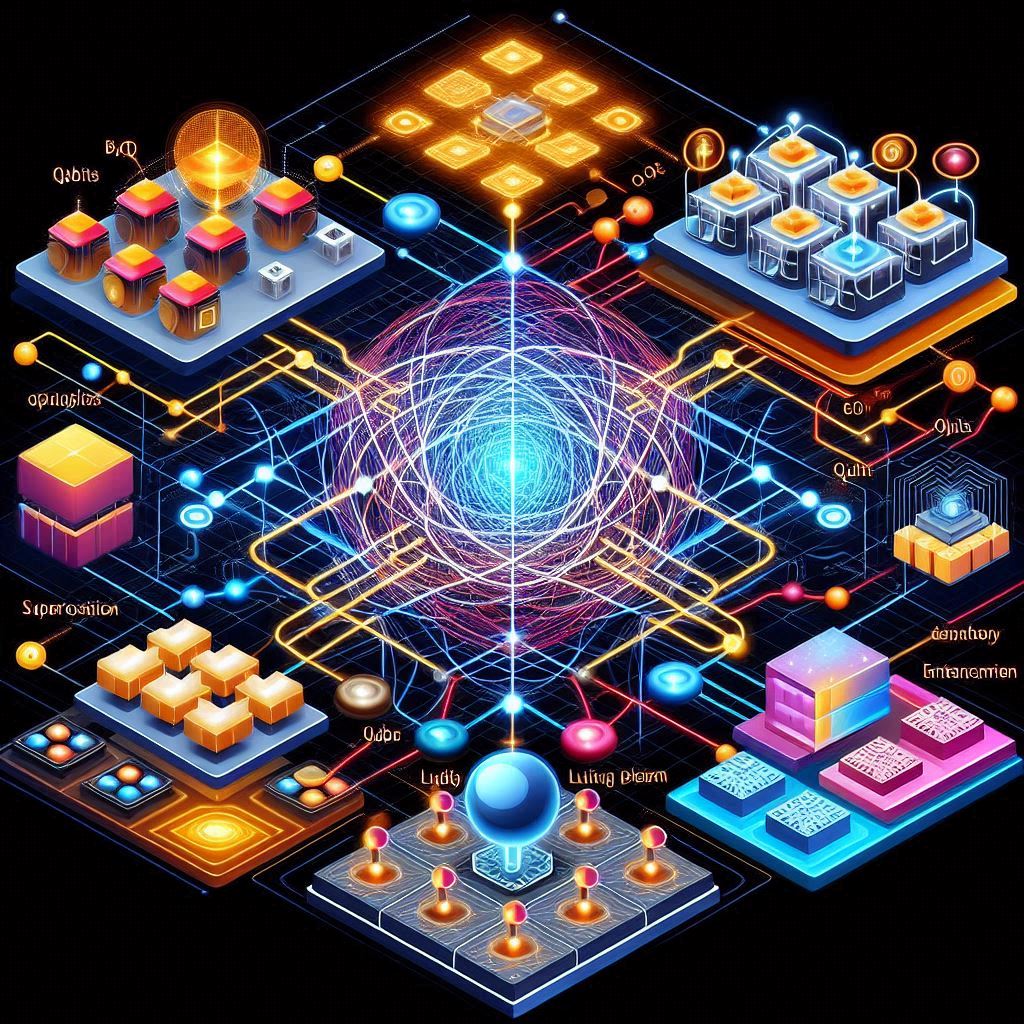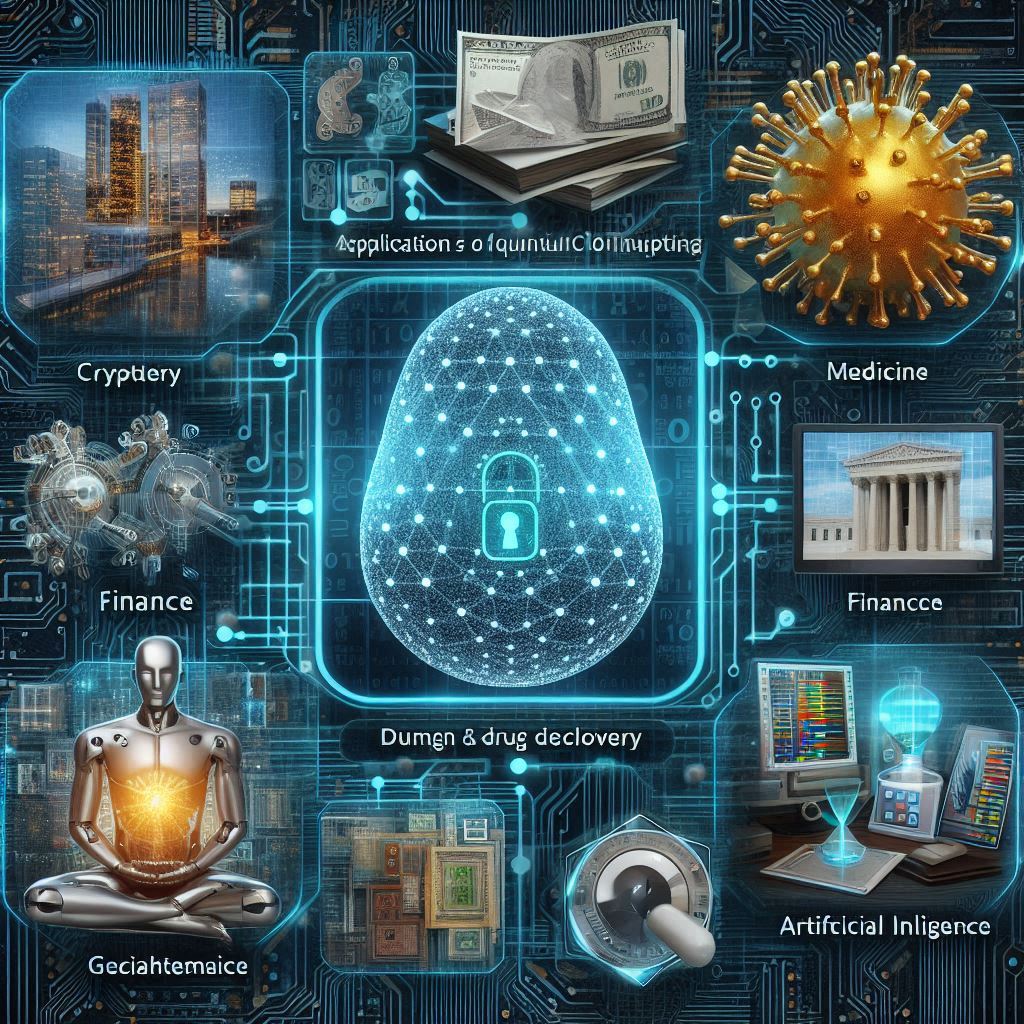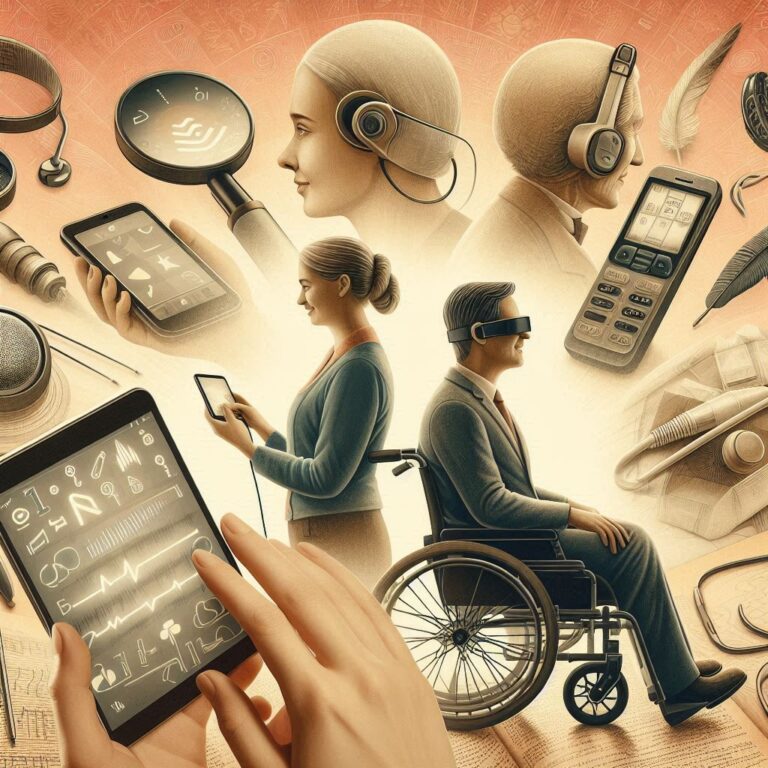Introduction: The Ultimate Guide to Quantum Computing
Quantum computing represents a paradigm shift in computational power, fundamentally altering how we approach complex problems. This ultimate guide to quantum computing explores the basics of quantum computing and answers the question, “What is quantum computing?” Unlike classical bits, which represent either a 0 or a 1, quantum bits, or qubits, can exist in multiple states simultaneously. This unique property exponentially increases computational power and enables quantum computers to tackle challenges beyond the reach of classical systems. Dive into this guide to understand the core principles and discover how quantum computing is set to transform various industries.

What is Quantum Computing?
Quantum Computing: A Paradigm Shift
Quantum computing signifies a groundbreaking advancement in computational capabilities. Unlike classical computers, which rely on bits to represent information as either 0 or 1, quantum computers harness the principles of quantum mechanics to utilize qubits. These qubits can exist in multiple states simultaneously, a phenomenon known as superposition, and can become interconnected through entanglement. This distinct ability allows quantum computers to handle massive amounts of data and tackle intricate problems faster than traditional computers.
The potential applications of quantum computing are far-reaching, with the promise to revolutionize fields such as drug discovery, materials science, cryptography, and artificial intelligence. As we delve deeper into the complexities of this technology, it becomes evident that quantum computing is not merely an incremental advancement but a fundamental transformation in the way we process information.
Basics of Quantum Computing and Key Concepts
What is Qubits: The Building Blocks of Quantum Computing
Central to quantum computing is the qubit, which serves as the quantum analog to a classical bit. Unlike bits, which can represent either a 0 or a 1, qubits can simultaneously exist in a superposition of both states. This property is essential for quantum computers to perform calculations at unprecedented speeds.

Superposition and Entanglement: The Quantum Advantage
Superposition enables qubits to explore multiple possibilities concurrently, accelerating problem-solving. Entanglement, a phenomenon where qubits become interconnected regardless of distance, allows for even more complex computations. These two quantum mechanical properties combined give quantum computers their immense computational power.
Understanding these foundational concepts is crucial to grasping the potential and limitations of quantum computing.
How Quantum Computers Work
Unlocking the quantum Mechanics principles
Quantum computers operate on principles fundamentally different from classical computers. At the heart of these machines lies the qubit, a quantum bit capable of existing in multiple states simultaneously due to superposition. This property, combined with entanglement, allows for processing information in ways unimaginable for classical systems.
Quantum Circuits: Quantum operations are executed through quantum circuits. These circuits manipulate qubits using quantum gates, analogous to logic gates in classical computers. However, quantum gates operate on qubits, performing operations like superposition, entanglement, and measurement.

Quantum Algorithms: To harness the power of quantum computers, specialized algorithms are required. Shor’s algorithm, for instance, can factor large numbers exponentially faster than classical algorithms, with implications for cryptography. Grover’s search algorithm offers a quadratic speedup for unstructured search problems.
Understanding the intricate workings of quantum computers requires a grasp of quantum mechanics, but the potential implications for fields like cryptography, materials science, and drug discovery are profound.
The Evolution of Quantum Computing
Significant milestones and the contributions of visionary scientists have marked Quantum computing’s journey from a theoretical concept to a tangible reality.
Key Milestones and Breakthroughs:
- Theoretical Foundations: The development of quantum mechanics by physicists like Max Planck, Albert Einstein, Niels Bohr, and Erwin Schrödinger laid the groundwork for quantum computing.
- Richard Feynman’s Vision: The concept of quantum computers as simulators of quantum physics was introduced by Richard Feynman, inspiring early research.
- Quantum Supremacy: Google’s claim of achieving quantum supremacy in 2019 marked a significant milestone, demonstrating the potential of quantum computers to outperform classical computers on specific tasks.
- Hardware Advancements: Continuous progress in building stable and scalable quantum computers, with improvements in qubit coherence times and error correction.
While challenges persist, the rapid pace of development in quantum computing suggests a promising future.
Real-world Applications of Quantum Computing
The potential of quantum computing extends far beyond theoretical concepts. Its practical applications across various industries hold the key to solving some of the world’s most complex challenges.
Cryptography
Quantum computing poses both a threat and an opportunity to the field of cryptography. While it has the potential to break current encryption standards, it also offers solutions like Quantum Key Distribution (QKD) to ensure secure communication.
Medicine and Drug Discovery
By simulating complex molecular interactions, quantum computers can accelerate drug discovery processes, leading to the development of new treatments for diseases. Additionally, they can analyze vast amounts of medical data to identify patterns and improve patient care.
Finance
Quantum computing can revolutionize the financial industry by optimizing investment portfolios, managing risks, and detecting fraud more efficiently. Its ability to handle complex data sets and perform simulations can provide financial institutions with a competitive edge.

Artificial Intelligence
The synergy between quantum computing and artificial intelligence holds immense potential. Quantum machine learning algorithms could tackle problems that are currently intractable for classical computers, leading to breakthroughs in areas like natural language processing and image recognition.
Other Industries
Beyond these core areas, quantum computing has applications in materials science, supply chain optimization, and climate modeling. Its ability to simulate complex systems and optimize processes can drive innovation across various sectors.
By exploring these real-world applications, we can gain a deeper understanding of the transformative power of quantum computing and its potential to shape the future.
The Future of Quantum Computing: Trends and Predictions
The trajectory of quantum computing is marked by rapid advancements and immense potential. Understanding current trends and making informed predictions is crucial for grasping the technology’s transformative impact.
Current Trends in Quantum Computing
- Increased Investment: Major tech companies and governments are pouring significant resources into quantum computing research and development.
- Hardware Advancements: Continuous improvements in qubit stability and coherence are extending the capabilities of quantum computers.
- Quantum Algorithm Development: Researchers are actively exploring new quantum algorithms for various applications.
- Hybrid Quantum-Classical Computing: The integration of quantum and classical computing for specific tasks is gaining traction.
- Quantum Error Correction: Efforts to address the challenges of quantum decoherence are progressing steadily.
Future Predictions for Quantum Computing
- Quantum Supremacy Across Diverse Fields: Quantum computers are expected to surpass classical computers in solving complex problems in fields like materials science, drug discovery, and optimization.
- Quantum Internet: The development of quantum networks could revolutionize communication and data security.
- Quantum Artificial Intelligence: The convergence of quantum computing and AI could lead to unprecedented breakthroughs in problem-solving and decision-making.
- Economic and Social Impact: Quantum computing has the potential to reshape industries, create new jobs, and address global challenges.
The Impact on Various Sectors
- Finance: Quantum computing can optimize financial portfolios, detect fraud, and model complex financial systems.
- Healthcare: Accelerate drug discovery, improve medical imaging, and optimize healthcare delivery.
- Materials Science: Discover new materials with enhanced properties for various applications.
- Cybersecurity: Develop quantum-resistant encryption algorithms and protect sensitive data.
- Climate Modeling: Simulate complex climate systems and develop strategies to mitigate climate change.
By staying informed about these trends and predictions, we can better understand the potential of quantum computing to transform our world.
Conclusion
Quantum computing represents a monumental leap forward in computational power, with the potential to revolutionize industries and solve complex problems that were once deemed intractable. By understanding the fundamental principles of qubits, superposition, and entanglement, we can begin to grasp the immense possibilities this technology offers.
While significant challenges remain, the rapid pace of research and development is steadily bringing us closer to a quantum future. As this field continues to evolve, it is essential to stay informed about the latest advancements and explore the potential applications that will shape our world.
Let’s continue the conversation! Share your thoughts on the future of quantum computing in the comments below.
#quantumcomputing #technology #futureoftech #science
Want to delve deeper into the quantum realm? Explore our blogs for more in-depth articles on specific quantum computing topics.







